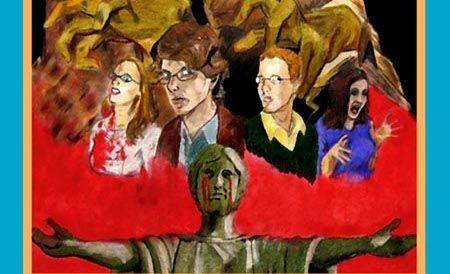The University of Illinois Versus a Mummy. At first glance, not your typical love story movie. But it was the unconventional beginning to what would become Chris and Anne Lukeman’s love story — and, ultimately, their business.
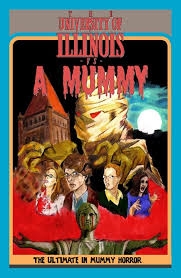 After meeting during the filming of their Mummy movie in 2005, the Lukemans began their collaboration as active filmmakers and video producers (and, subsequently, as husband and wife). Their comedy short films have screened on VH1, Comedy Central, The Big Ten Network, PBS affiliates, and national film festival programs, and have received Mid America Emmy, Hugo Television Award, and National Student Television Award recognition.
After meeting during the filming of their Mummy movie in 2005, the Lukemans began their collaboration as active filmmakers and video producers (and, subsequently, as husband and wife). Their comedy short films have screened on VH1, Comedy Central, The Big Ten Network, PBS affiliates, and national film festival programs, and have received Mid America Emmy, Hugo Television Award, and National Student Television Award recognition.
In addition to running their video production company, Railsplitter Media, they currently work for the University of Illinois at Urbana-Champaign, where Chris manages the local access television channel, UI-7, and both produce video for UIUC Public. (You can see Chris and Anne’s narrative comedy/horror/sci-fi film work here.)
Chris and Anne are also founding board members of the Champaign-Urbana Film Society, an organization dedicated to supporting film production and film appreciation in the community. One of CUFS’s main initiatives is the “Pens to Lens” student screenwriting competition which invites local K-12 students to submit short screenplays. Local filmmakers turn the screenplays into films, and local designers from CUDO turn them into movie posters.
On February 5th at Buvon’s Wine Bar, as part of the Meet the Pros series sponsored by Parkland, the Champaign-Urbana Design Organization (CUDO), and 40 North, Chris and Anne Lukeman will speak about current trends in professional video production, and the effect on all aspects of advertising, marketing, and the future of video.
As a lead-in to their presentation, Chris and Anne were kind enough to share a little bit of their backstory…
Smile Politely: I read that you two met as members of the University of Illinois student film club. Was it romance then business, or business then romance?
 Chris Lukeman (left): I was president of Illini Film and Video in 2005 and was directing The University of Illinois Versus a Mummy, which is a self-explanatory (and cheesy) feature length horror-comedy-musical. We were filming a little bit every week. Anne had read about the student film club and decided to help out on a few of our shoots. That fall we started dating.
Chris Lukeman (left): I was president of Illini Film and Video in 2005 and was directing The University of Illinois Versus a Mummy, which is a self-explanatory (and cheesy) feature length horror-comedy-musical. We were filming a little bit every week. Anne had read about the student film club and decided to help out on a few of our shoots. That fall we started dating.
Anne Lukeman: Business first. I met Chris at my very first Quad Day, where I was excited to stop by the Illini Film and Video booth! It was only after we worked together on some short films and The University of Illinois versus a Mummy that we started dating! (Don’t listen to Chris: we started dating in the spring of 2006 — NOT the fall.)
SP: Anne, you’re a Phi Beta Kappa with a degree in history, and Chris, you have a law degree… and that led to filmmaking how?
A. Lukeman: I was always interested in movies and TV. When I was in high school, I really wanted to be Indiana Jones! So I went into history thinking I’d go to grad school and become a professor. At some point in time during college, when I was part of IFV and making videos for fun, it occurred to me that people would pay you to do this. And it paid a heck of a lot better than my job at the library. So I started working for University Housing as a student video producer (with Chris), and it continued from there.
C. Lukeman: Before, after, and during law school, I was still very involved in the filmmaking process. In fact, during law school, I was on the executive board and created content for a student television show called Alt.new 26:46 that won regional Emmy, National Student Emmy, and Hugo television awards.
My legal education was a lot more about understanding contracts and working with people from a business perspective, than going to court. This background then translated into filmmaking and business ownership. After law school, I put this knowledge towards starting Railsplitter Media which Anne and I started in 2011.
SP: What was your Plan B?
C. Lukeman: There really was no Plan B for me. I knew that video production was what I wanted to do and it was pretty clear that the way technology and the internet were trending meant there would be a larger and larger call for the skill set.
A. Lukeman: Grad school, I guess? I’m the business end of our partnership, so maybe I would’ve done office work. I do a lot of spreadsheets and financial stuff.
SP: How would you describe your filmmaking style?
A. Lukeman: Low budget, high quality. Goofy. Genre.
C. Lukeman: My filmmaking style is all about story. In my commercial work, I often obsess over every shot, every color, every sound. Even if most viewers never notice it, every detail should emphasize the point of the production.
For our sci-fi and horror narrative films, I’m always pushing for originality. I want to show viewers something they have never seen, or if they think they have seen it, to flip their presumptions. The U of I Versus a Mummy is sort of an example of this: more than a horror film, it is a comedy about horror films and watching horror films.
When directing, I pride myself on economy. I have a good sense of how to get the most out of a limited schedule or limited budget.
SP: Where do you find your inspiration?
C. Lukeman: For our films, my inspiration is pretty grounded in the 80s.
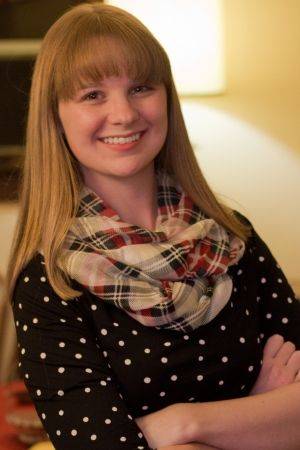 A. Lukeman (right): John Carpenter (I went as Jack Burton from Big Trouble in Little China for Halloween this year!). Spielberg, of course. We read a lot of Stephen King and Neil Gaiman. Locally, we have a lot of amazing filmmaker friends who inspire me — Mike Trippiedi is an amazing director, and I’ve learned a lot about directing actors from him. Thomas Nicol is a powerhouse, and keeps winning awards and making stuff that’s super competitive on a national level.
A. Lukeman (right): John Carpenter (I went as Jack Burton from Big Trouble in Little China for Halloween this year!). Spielberg, of course. We read a lot of Stephen King and Neil Gaiman. Locally, we have a lot of amazing filmmaker friends who inspire me — Mike Trippiedi is an amazing director, and I’ve learned a lot about directing actors from him. Thomas Nicol is a powerhouse, and keeps winning awards and making stuff that’s super competitive on a national level.
SP: What does it take to be a successful filmmaker in Central Illinois?
A. Lukeman: The same thing that it takes to be a successful filmmaker anywhere. Go make films. Keep making films until they don’t suck anymore. Lather, rinse, repeat.
Seriously, though, one of the best things about being in this area is that the film community is a true community – people want to help each other out, and see each other succeed. I know that’s not something you get in a lot of places. Folks here are happy to share their resources, experiences, and fan bases. It’s amazing. And I think it almost goes without saying that you can make a professional-looking movie with almost no budget anymore, since the camera gear and editing equipment has gotten so cheap, and the education on how to use them is all on the internet anymore.
C. Lukeman: Central Illinois is an amazing hub of filmmakers. Over the past five to ten years, the amount of local production has increased exponentially. One of the best things you can do is connect with the local scene — especially if you are just starting out. It is important to be on all kinds of sets to learn how to do this, and to learn how to do this safely.
SP: Do you collaborate only locally on projects? Or do you work with others outside this area? Who have you collaborated with?
C. Lukeman: We cast and crew out of Chicago on occasion. We have a lot of friends up there, but many of our productions are 100 percent local. People are always surprised to find out that nationally competitive films and commercial productions are being made right here.
A. Lukeman: We mostly collaborate locally, but we often work with folks outside the area who also do genre work — we meet a lot of similarly-minded people at film festivals and conventions, like C2E2 and GenCon. Locally, we’ve worked with too many to people to name. Regular Kill Vampire Lincoln collaborators include Thomas Nicol, Tim Meyers, Andrew Stengele, AJ Christensen, Andrew Gleason, and I’m sure I’m missing a few people. We’ve done some cross-collaboration with the Zombie Orpheus Entertainment folks up in Seattle and the AIDAN5 crew from Ohio. And, as Chris mentioned, we also cast and crew out of Chicago, though many have connections to the Champaign–Urbana area (like Maggie Gottlieb, one of the stars in our 1970s web series, who I went to school with here at the U of I).
SP: Do you both do everything, or do you rely on others for specific expertise (for example, editing, et cetera)?
A. Lukeman: A little of both. I do the business/finance end of things, and tend to be the one who’s organizing everything to carry out Chris’s vision as the director. I also end up working with the actors a bit more. We split editing up pretty evenly, I think, since neither of us really loves it, but we both can do it.
C. Lukeman: We both can do a bit of everything, but often on-set I direct and Anne produces (manages the project and puts out all the metaphorical fires). It takes a lot of other people to make these movies. For example, our sets for Once Upon a Time in the 1970s have had up to twenty-five crew members (including sound technicians, the cinematographer and camera assistants, lighting technicians, caterers, wardrobe department, and makeup—not to mention five to ten puppeteers).
In post-production, Anne does a lot of the actual editing and I do a lot of the special effects.
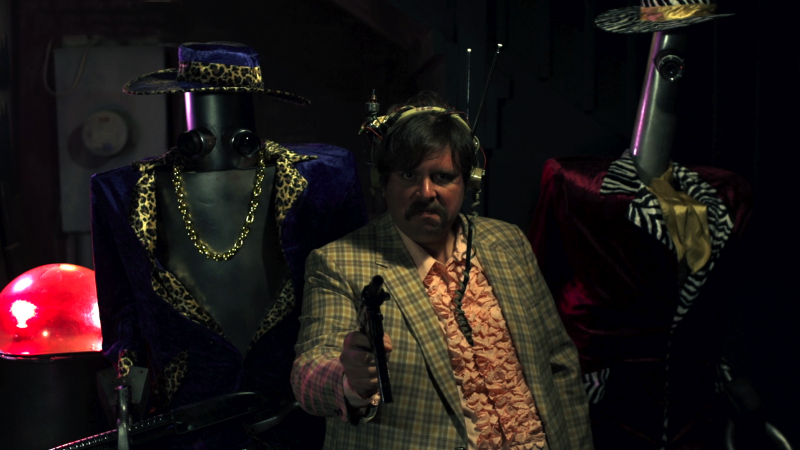
SP: What led to producing the Dell and CVS videos?
C. Lukeman: Several years ago, brands started looking to crowd-created videos. Many of these contests were cool, but they were oftentimes glorified popularity contests, where someone would be constantly bugging their friends/family to vote every day. Those never appealed to us, but we heard about a company called Poptent that actually treated video contests like a sustainable business. The differences were that the brand gave producers a full creative brief, offered national commercial rates, guaranteed they would purchase a certain number of spots, and, best of all, there was no voting. If your spot was the best, or fit the brand’s message the best, you would win. We loved that transparency and entered several. We were lucky enough to win two.
A. Lukeman: Some friends of ours, Joe Taylor and Bill Kephart, had some luck selling videos through Poptent. At the time, we were launching Railsplitter Media and wanted to make stuff we could show on our reel, so we started entering our work as well. For the Dell spot, we really wanted to use the robot we had built (for the 1970s series), and it seemed like a good fit. If it hadn’t won, we would’ve kept making spots with the robot until one did win!
SP: Are you working on more projects like these?
A. Lukeman: We stopped for a while once we started working for the University full-time, but we may get back into them. Competition is pretty fierce right now!
SP: How did you do the laser effect at the end of the Dell video?
C. Lukeman: The laser, smoke, and other visual effects were done in Adobe After Effects, the industry standard for basic digital special effects
SP: Is Anne the “screamer” at the end of the Dell video?
C. Lukeman: Anne is the screamer. I was surprised they didn’t want it removed! I’m not positive that screaming helps sell laptops, but what do I know?
SP: What was your most favorite project to work on to date?
A. Lukeman: For me, probably Tunnel to Greenland, which was the short I did for last year’s “Pens to Lens” student screenwriting contest. It was a challenge, as I don’t usually direct, and I’d never worked with kids before, but it was really rewarding, and I’m so proud of how it turned out.
C. Lukeman: My favorite and most difficult project is the ongoing Once Upon a Time in the 1970s series of science fiction short films. We have been working on them since 2010 and are finally getting ready to launch them online — which has always been the goal.
The story is about a pair of scientist heroes in the probably-alternate 70s that are investigating a hole in time while fighting robots with ray guns and disco.
I’m very proud at what the series has accomplished so far. We have a great cast and crew that have been able to bring some amazing performances and visuals to our weird and wonderful sci–fi fairy tale.
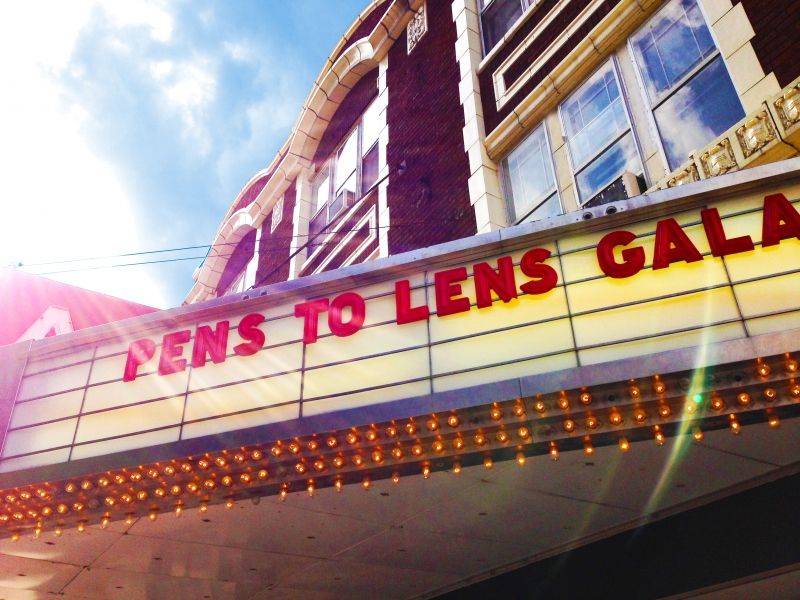
SP: What was your most challenging project to work on?
A. Lukeman: The1970s series has been difficult, but very fun. A lot of late nights… and cleaning the old White Horse Inn to transform it into a disco. Plus, we’ve been working on the series for several years now…
SP: How do you promote your films?
A. Lukeman: We go to some film festivals, but mostly comic/gaming conventions, like C2E2 and Wizard World in Chicago, and Gen Con in Indianapolis. We’ve also connected with other independent genre producers around the country to promote each other.
C. Lukeman: Locally, we have had a lot of screenings on campus, at the Art Theater, even outside at Mike ‘N Molly’s. A great local film festival called The New Art Film Festival is coming up in April.
Aside from that, we are a bit unorthodox in how we often get booths at nearby comic conventions and sell DVDs straight to fans, who then come back the next year and ask “What else you got?,” which is incredibly gratifying.
SP: What “words of wisdom” do you have for anyone wanting to break into filmmaking?
A. Lukeman: Cameras are cheap, editing software is cheap. There’s no entry barrier anymore. If you want to be a filmmaker, go out and make a film. Practice, practice, practice, and you will learn what you need to know.
C. Lukeman: Just go out and do it. Start with something small — a one to five minute short script. Cast it with friends, shoot it with whatever you can get your hands on (don’t spend too much money!), and edit it. Then take a big step back and be honest about how you can get better. Meet with the local film community — we aren’t too scary. Rinse. Repeat.








